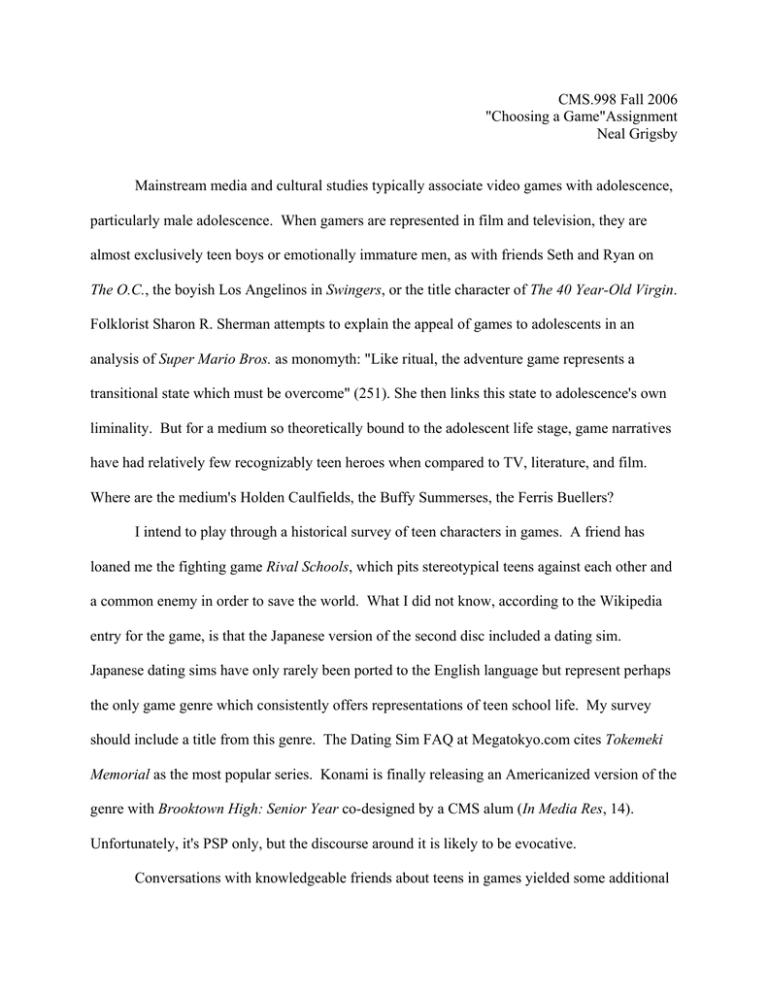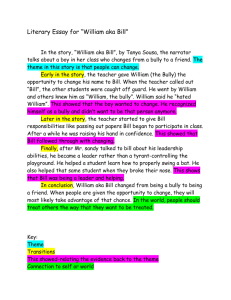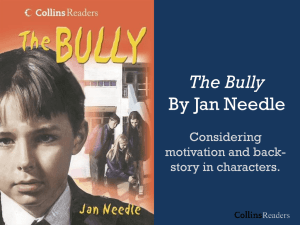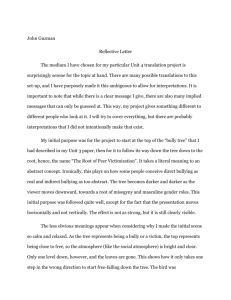CMS.998 Fall 2006 "Choosing a Game"Assignment Neal Grigsby
advertisement

CMS.998 Fall 2006 "Choosing a Game"Assignment Neal Grigsby Mainstream media and cultural studies typically associate video games with adolescence, particularly male adolescence. When gamers are represented in film and television, they are almost exclusively teen boys or emotionally immature men, as with friends Seth and Ryan on The O.C., the boyish Los Angelinos in Swingers, or the title character of The 40 Year-Old Virgin. Folklorist Sharon R. Sherman attempts to explain the appeal of games to adolescents in an analysis of Super Mario Bros. as monomyth: "Like ritual, the adventure game represents a transitional state which must be overcome" (251). She then links this state to adolescence's own liminality. But for a medium so theoretically bound to the adolescent life stage, game narratives have had relatively few recognizably teen heroes when compared to TV, literature, and film. Where are the medium's Holden Caulfields, the Buffy Summerses, the Ferris Buellers? I intend to play through a historical survey of teen characters in games. A friend has loaned me the fighting game Rival Schools, which pits stereotypical teens against each other and a common enemy in order to save the world. What I did not know, according to the Wikipedia entry for the game, is that the Japanese version of the second disc included a dating sim. Japanese dating sims have only rarely been ported to the English language but represent perhaps the only game genre which consistently offers representations of teen school life. My survey should include a title from this genre. The Dating Sim FAQ at Megatokyo.com cites Tokemeki Memorial as the most popular series. Konami is finally releasing an Americanized version of the genre with Brooktown High: Senior Year co-designed by a CMS alum (In Media Res, 14). Unfortunately, it's PSP only, but the discourse around it is likely to be evocative. Conversations with knowledgeable friends about teens in games yielded some additional recommendation. Kristina Drzaic was enthusiastic to recommend Legend of Zelda: Ocarina of Time, which involved the eternally childlike hero Link being unnaturally aged to late adolescence. Ivan Askwith advised, "Psychonauts is great at taking a weird look at adolescent issues through a sort of twisted filter." Stefan Werning, a visiting game scholar, previously brought to my attention the Japanese "raiser" game Princess Maker, in which the player guides the development of an adopted teenage daughter. The 400lb gorilla of teen games, however, is yet to be released. Bully from Rockstar Games, makers of the Grand Theft Auto series, is scheduled for release this October, a year after its original release date. Controversy has surrounded the game, with anti-gaming litigator Jack Thompson calling it a "Columbine simulator" before anyone has actually played it (qtd. in Jones). An early article described the plot in this way: "it’s now your turn to rule the school through intimidation and—when needed—muscle" (Intihar). In short, you are the titular bully. After the year-long delay, some believe Rockstar was modifying the plot to appease parents and interest groups (Totilo). A new trailer for the game indeed suggests that the main character is now an underdog kid who, in part, protects the weak from bullies. "This school is filled with bullies and maniacs!" he exclaims incredulously to a teacher (Rockstar Games, Bully Trailer 1). I shall occupy myself during the first half of the semester with Rival Schools, Tokemeki Memorial or another relevant dating sim, Princess Maker 2, Psychonauts, and Ocarina of Time. When and if Bully is finally released, I'll hopefully be able to use skills acquired through hundreds of hours of playing Grand Theft Auto to complete the game in a timely manner. I'll be looking for how the medium of video game transforms conventions from adolescence narratives in other media, and critically examine this implicit link between the experiences of gaming and adolescent development. Works Cited: Askwith, Ivan. Personal Interview. 13 Sept 2006. "Dating Sims and Visual Novels: Frequently Asked Questions." MegaTokyo.com. 15 May 2001. <http://www.megatokyo.com/extra/dating_sim_faq-ver1.htm> "Direkova-Designed Game To Be Released Next Year." In Media Res. Summer 2006: 14. Drzaic, Kristina. Personal Interview. 13 Sept 2006. Intihar, Bryan. "Bully." Electronic Gaming Monthly. August 2005. <http://findarticles.com/p/articles/mi_zdegm/is_200508/ai_n13639912> Jones, K.C. "Lawyer Fighting to Ban 'Columbine Simulator.'" TechWeb Technology News. 14 Aug. 2006. <http://www.techweb.com/wire/ebiz/191902549> "Rival Schools." Wikipedia. 15 Aug 2006. <http://en.wikipedia.org/wiki/Rival_Schools> Rockstar Games: Bully. 13 Sept 2006. <http://www.rockstargames.com/bully/home/> Sherman, Sharon R. "Perils of the Princess: Gender and Genre in Video Games." Western Folklore. 56.3-4 (Summer-Autumn, 1997): 243-258. Totilo, Stephen. "Rockstar Games' 'Bully' Won't Take Your Lunch Money Until '06." MTV News. 7 Sept. 2005. <http://www.mtv.com/news/articles/1509096/20050907/index.jhtml?headlines=true> Werning, Stefan. Personal Interview. 12 Dec 2005.






